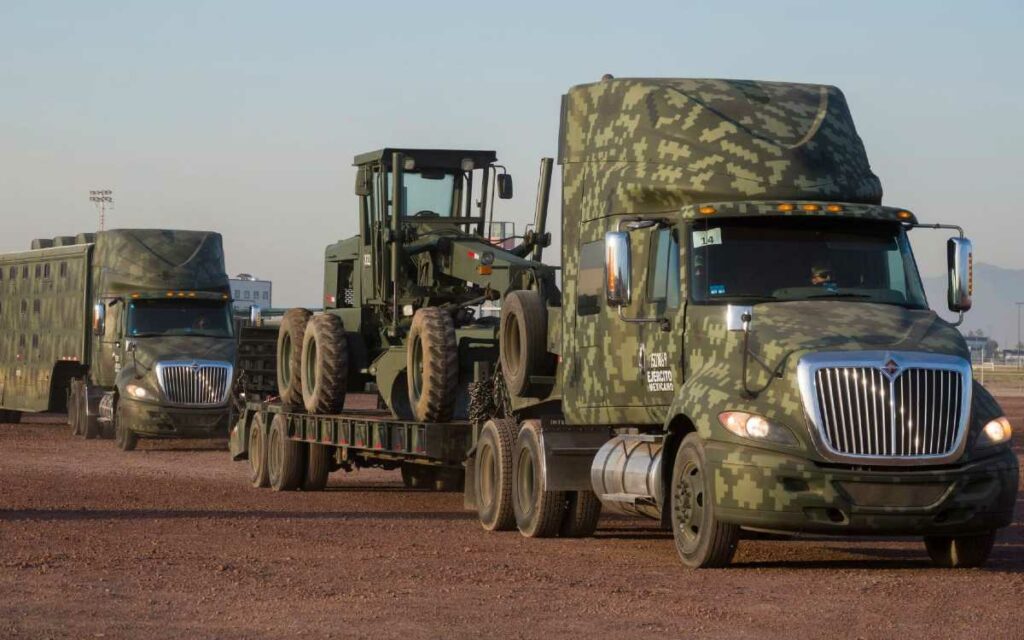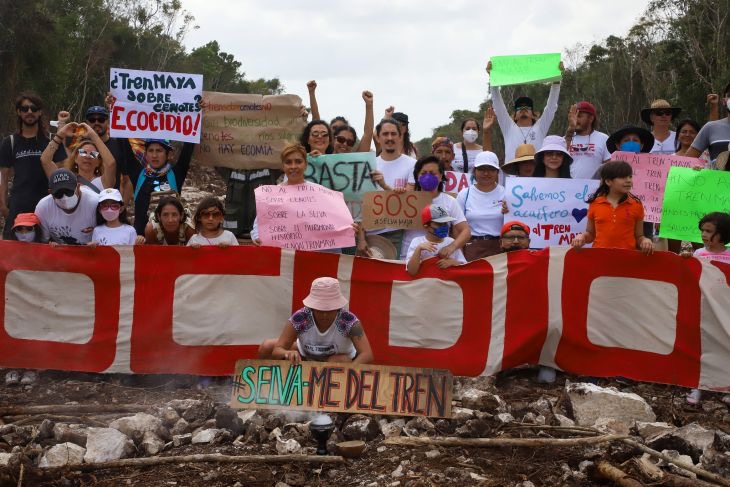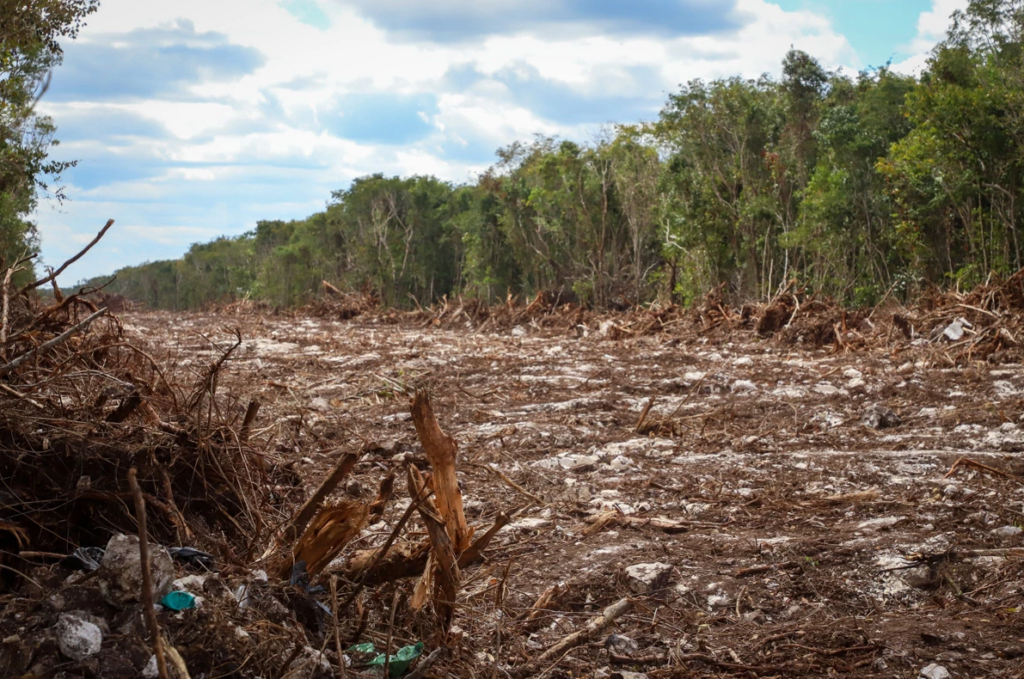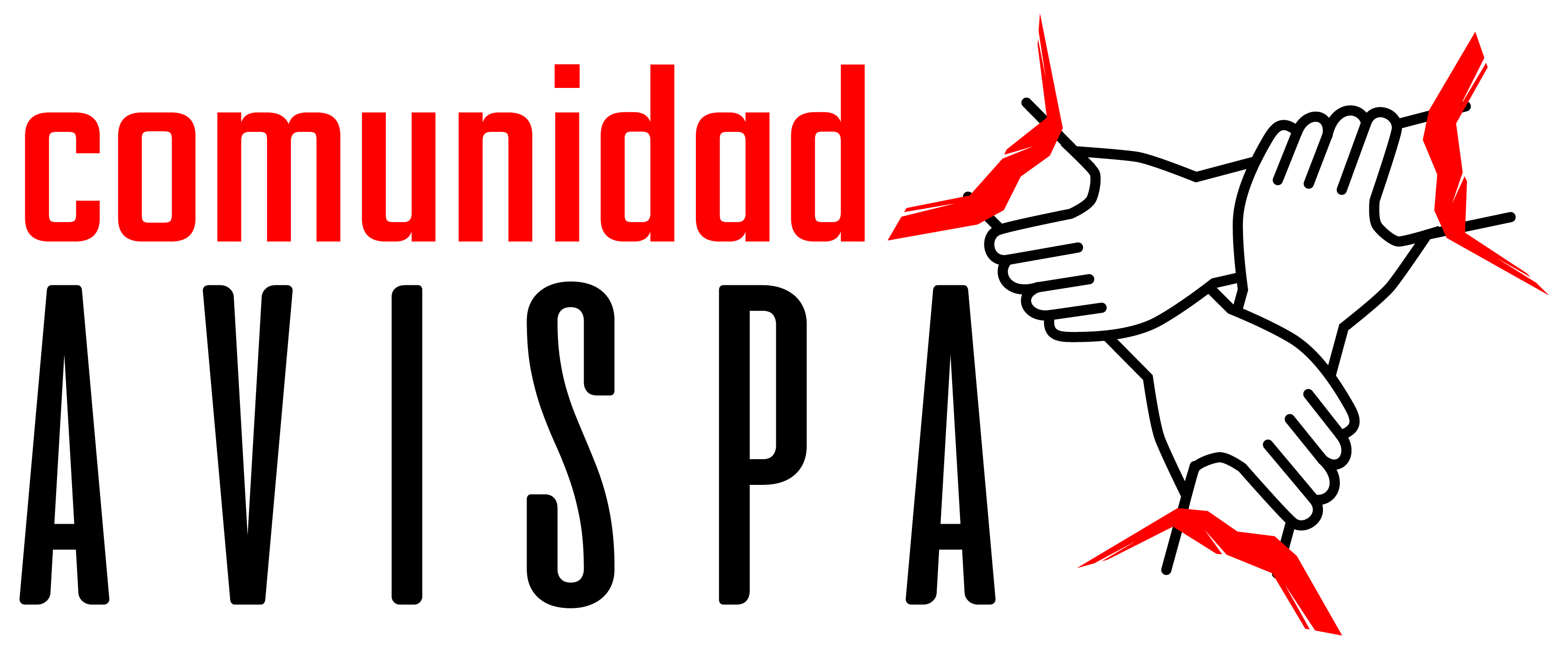Translated by Schools for Chiapas
On the cover: Advance of the construction work on the Mayan Train cause the deforestation of hundreds of hectares of jungle.
It is more than a slogan. The phrase, “the land is not for sale”, reiterated in the testimonies shared by participants of the most recent Assembly of the National Indigenous Congress (CNI), held on March 4 and 5, embodies the fierce defense of native peoples in the southeast of Mexico, where they are already experiencing the negative effects of the imposition of one of the star projects of the so-called Fourth Transformation: the Maya Train in the Yucatan Peninsula.
In its advancement, it links a series of megaprojects to offer the territories of indigenous communities to the markets: industrial parks, energy plants, infrastructure for the circulation of goods and military barracks, to mention just a few.
As Avispa Mídia has documented, since the beginning of the administration of Andrés Manuel López Obrador (AMLO), the use of diverse tactics to implement, at any cost, both the Interoceanic Corridor in the Isthmus of Tehuantepec, in Oaxaca, and the Mayan Train in the territories of the Yucatán peninsula has been evident.
Among the strategies identified in both megaprojects are the simulation of consultations, cooptation through assistance, falsification of signatures and assemblies to accept the projects and non-compliance with judicial resolutions ordering a halt to the works. At the same time, violence is implemented in its different forms, specifically criminalization and persecution against those who demand the defense of their territory.
In this installment, we take up the testimony of organizational processes in Quintana Roo from where they make a call to unveil the strategies and the intertwining of actors, legal and illegal, who promote the engines of reconfiguration in the Mexican Southeast.
It is important to highlight the role of the Armed Forces who, under the pretext of executing the works, have extended their presence in the indigenous territories. At the same time as militarization is advancing, the communities charge that organized crime is also making inroads and, with it, violence through executions, disappearances and other crimes within the native populations.

This publication is part of a series of dialogues we held with participants in the CNI Assembly held in Tehuacán, Puebla. Here you can read the first installment on indigenous organizations in Michoacán.
The Assembly of Defenders of the Maya Múuch’ Xíinbal Territory, which celebrated five years of existence last January, defines itself as an itinerant Assembly through which different communities of the Yucatán peninsula share the problems surrounding the megaprojects that are landing in their territories in order to build agreements on strategies for their defense.
Made up of ejidatarios and peasants from Mayan communities, one of the main agreements of the Múuch’ Xíinbal Assembly is not to sell or rent land in the face of “megaprojects implemented by companies that, in classic conquistador fashion, come to take our lands to develop their business,” according to its members.
The Mayan organization has denounced the negative effects unleashed by the avalanche of extractive projects, including those disguised as “green”, among which are the plans to erect 25 wind and photovoltaic farms on the peninsula. They have also raised their voices against the proliferation of hundreds of pig farms that threaten to contaminate the largest subway water reserve in the country and, of course, against the devastation caused by the construction of the Tren Maya.
The following are excerpts from a conversation with Alexis Juuj, a member of the community of Chunhuhub and a member of the Múuch’ Xíinbal Assembly. He talks to us about the progress of Section 6, which runs from Tulum to Chetumal, and whose construction is being carried out by the Mexican army, which, he accuses, has led to the militarization of the communities.
Avispa Mídia (AM): Can you give us an update on the progress of the train megaproject in your region?
Alexis Juuj (AJ): For the so-called Mayan train project, they have practically opened the road into the jungle. In spite of the fact that they have been constantly changing the tracks where the train is going to pass, because it does not really have an executive plan.

They have been improvising, passing over cenotes, caves, which they have been filling with stone material and garbage. From the beginning we pointed out that the ground is not suitable for a project of this magnitude.
Currently the project of the train, wrongly-named Maya, is already very advanced. This has also led to the communities filling up with military personnel, who are in charge of some sections of the construction of the train.
AM: The CNI Assembly that convenes us today proposes to reflect on the relationship between violence, militarization and megaprojects, how is this being expressed in the specific instance of the train?
AJ: Since the construction of the train and the militarization of the area began, there is something very clear: the rate of violence has shot up since the arrival of the military in the communities, whose presence was justified by the need for greater security. However, the opposite is true.

There is something very interesting here, because previously in the small communities of Quintana Roo and Yucatan you did not hear anything about disappearances or about “levantones”, about confrontations with the drug traffickers. However, since the beginning of the construction, we started to hear a lot about this. And it is happening specifically in the communities, not in the big cities as it used to be: Cancun, Playa del Carmen, Tulum. Now they are already inside the communities. So, women, children and men are disappearing, but the interesting thing is that most of the young men and adult men who disappear are found executed and the women are not found, nor are the children, which leads us to think that it is really trafficking in women and children. This is what is happening now in the communities. In addition, there is a link between the National Guard and organized crime, which is something we already know. Organized crime has flooded the communities with drugs to enlist in their ranks the young people of the communities, who are then used as cannon fodder for drug trafficking.
AM: What other actors show up in the territories and what are the effects of the advancement of the project?
AJ: The project does not mention the secondary effects that the train will bring. There are communities right now where companies are moving in, especially energy companies, wanting to set up in ejidos that are close to where the train is going to pass.
In my community of Chunhuhub, there is a town very close to where a substation of the Federal Electricity Commission (CFE) is being installed. Fonatur (National Fund for the Promotion of Tourism) presented the plans for the substation, which is being built exclusively to feed the Section 6 station that will be in Felipe Carrillo Puerto, 60 kilometers from where the train will pass. In that same ejido, a 2,000 hectare solar park is to be installed.
In that area, for example, in my community, there are 400 people who are not from the peninsula, who are working on these energy projects. This has caused violence within the social fabric, because of the ways that these people have brought with them. The people working there are also getting involved with the women of the communities and this has caused family problems.
In addition, in other areas, where the construction of the train has advanced much more, such as in the Izamal area, there are not only workers from all over the country, but also Central Americans who are migrating to the US. Many people are being hired to move forward as quickly as possible with the construction work, regardless of whether they are undocumented. This has also brought drug addiction problems within the communities, because many of these people bring other ways of life, which is spreading to the community.


